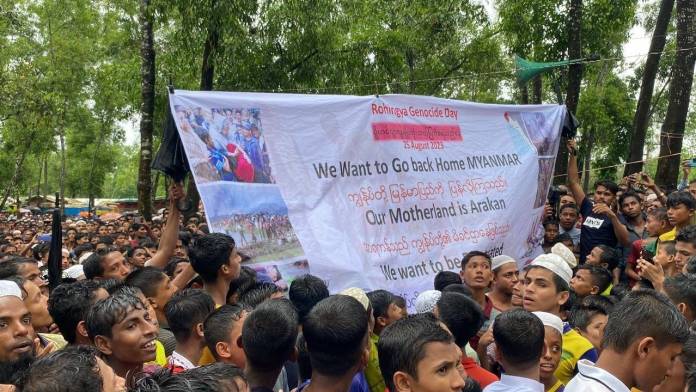The U.N. Secretary-General António Guterres called for an end to the violence in Myanmar and to ensure the protection of civilians “in accordance with applicable international human rights standards and international humanitarian law” ahead of Sunday’s seventh commemoration of Aug. 25, 2017.
This is the infamous date when the Myanmar military launched its “security clearance” operation in northern Arakan (Rakhine) State which killed thousands of Rohingya civilians and forced over 700,000 to flee for refuge into Bangladesh. It was labeled a genocide by the U.S. government in 2022.
“The dire security and humanitarian situation with ongoing access challenges has exacerbated pre-existing vulnerabilities of the people of Myanmar, including the Rohingya, who continue to face discrimination and persecution as the armed conflict escalates in Rakhine State,” Secretary-General Guterres said in a statement referring to the nationwide conflict in Myanmar since the uprising against the 2021 military coup began.
Human Rights Watch called out the Myanmar military and the Arakan Army (AA) for attacks against the Rohingya living in Maungdaw and Buthidaung townships of northern Arakan State.
The AA launched an offensive against the military to take control of southern and northern Arakan on Nov. 13 – following its success on the battlefield against the military in northern Shan State alongside its fellow Brotherhood Alliance members, the Myanmar National Democratic Alliance Army (MNDAA) and the Ta’ang National Liberation Army (TNLA), during Operation 1027.
“Rohingya in Rakhine State are enduring abuses tragically reminiscent of the military’s atrocities in 2017. Once again, armed forces are driving thousands of Rohingya from their homes with killings and arson, leaving them nowhere safe to turn,” said Elaine Pearson, the Asia director at Human Rights Watch.
Residents in northern Arakan State told Human Rights Watch that the AA was responsible for drone and artillery attacks that targeted over 200 Rohingya in Maungdaw near the Bangladesh border on Aug. 5. The AA was accused of committing widespread arson attacks in Buthidaung, which is located next to Maungdaw, after it took control of the town on May 18. Its spokesperson Khaing Thukha denied these accusations.
“The Naf River Massacre follows a pattern of similar drone strikes by the AA on urban wards of Maungdaw town and its surrounding Rohingya villages in recent weeks. It also follows ground reports indicating that Rohingya civilians are being strategically targeted by the AA and the Myanmar military with atrocities,” said a joint statement released by Rohingya human rights organizations.
The Independent Investigative Mechanism for Myanmar (IIMM) was established by the U.N. Human Rights Council in 2018 to investigate international crimes committed by the military against the Rohingya in northern Arakan. It is investigating the reported killings along the Naf River in Maungdaw.
“The [IIMM] has opened new investigations into these crimes and is collecting evidence of all alleged perpetrators regardless of their affiliation. However, this cycle of atrocities is likely to continue until perpetrators of earlier crimes face justice,” said Nicholas Koumjian, the IIMM head investigator, He added that the perpetrators responsible for these alleged crimes will be identified and held accountable in a court of law.
The AA released a report on Aug. 21 claiming that there is no evidence linking it to the drone and artillery attacks, which killed Rohingya in Maungdaw. The AA has vowed to investigate the alleged massacre once it gains full control of northern Arakan, but it has stopped short of inviting international investigators into AA-controlled areas.
“Thousands of Rohingya have been forced to flee on foot, with the Arakan Army herding them repeatedly into locations that offer scant safe haven,” said Volker Türk, the U.N. High Commissioner for Human Rights. “As the border crossings to Bangladesh remain closed, members of the Rohingya community are finding themselves trapped between the military and its allies and the Arakan Army, with no path to safety.”
Nearly one million Rohingya are living in refugee camps near Cox’s Bazar, located in the southeast of Bangladesh, near the Myanmar border. The U.N. has documented that at least 600,000 Rohingya remain in Arakan State where they are denied citizenship and freedom of movement.



